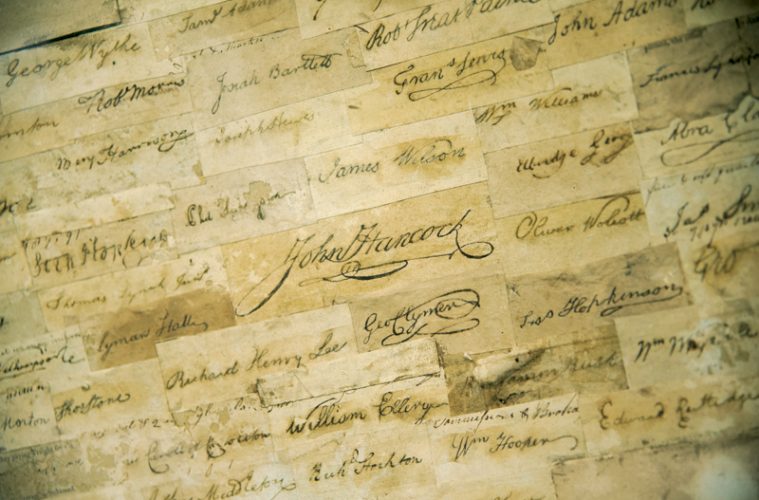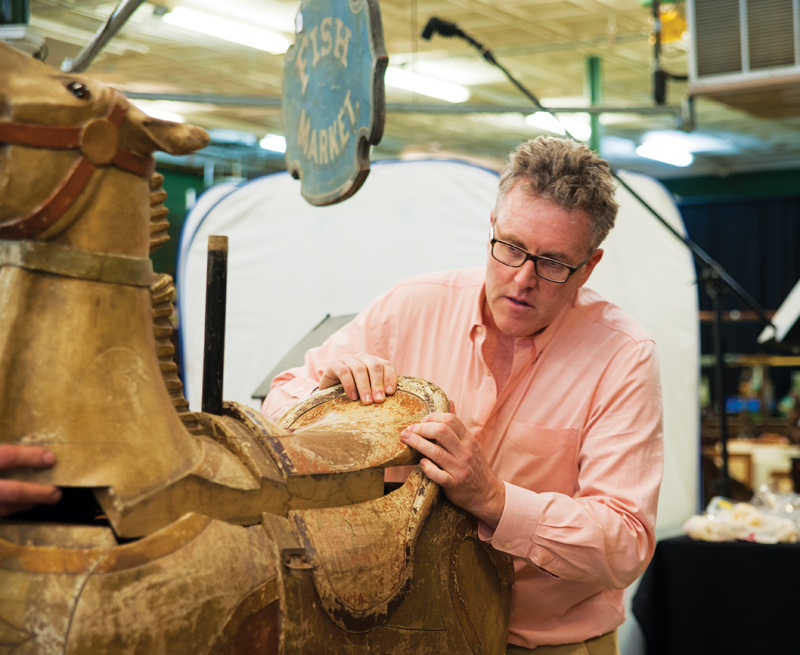A small Amesbury-based auction house deals in both off-beat and big-time items for sale.
John mcinnis auctioneers is in a state of barely controlled chaos. A beat-up cow head from the now-defunct Hilltop Steakhouse rests on a shelf, overlooking wire racks filled with Hummel figurines and tables arrayed with John F. Kennedy memorabilia. Campaign hats, rare photos signed by Jackie O., and piles of correspondence from the former president and his contemporaries—from McInnis’s recent “Legends Auction”—sit in neat stacks in the Amesbury shop, awaiting shipment to places as far as Oslo and Dublin.
Places as far as Oslo and Dublin. “We’re always in a state of transition,” says John McInnis a bit apologetically. As owner, professional estate appraiser, and auctioneer of the largest full-service auction house on Boston’s North Shore, his office is far from impressive—a makeshift workstation set up in the middle of the shop, offering easy access for cataloging items recently arrived from a dilapidated house in Ipswich.
McInnis has been steadily building areputation as a top auction house. Theywere the first New England auctioneers to sell a painting for $1 million, and have since handled two prestigious auctions of JFK memorabilia. But it’s the dirty, mysterious, and neglected items that really get hearts racing at the small company. Take the Ipswich property—barely visible from the road for the overgrown trees and bushes, and with its roof falling in, it has proven to be a treasure trove of early artifacts from all over the world.
“The condition was tough,” says Daniel Meader, gallery director, who assessed the property. “The roof was leaky, rodents had moved in and the wallpaper was coming off the walls. But I kept going and all of a sudden started finding early documents. It was then I realized it was not your average house.”
Among the items recovered: a pair of 18th -century shoes, remarkably intact with original buckles, more than 100 oil paintings, and a few real treasures. One is a daguerreotype, or early photograph on a silver or silver-coated copper plate, of gold miners; the other is a board displaying autographs, painstakingly cut from a variety of letters and receipts, representing almost everyone who signed the Declaration of Independence. While John Hancock’s signature takes center stage, the small signature of Button Gwinnett caught the appraiser’s eyes. As the second signer of the document, and someone who died at a relatively young age, it’s believed only 51 of his autographs exist, and could fetch a hefty sum. In 1993, one sold for $150,000, double the pre-auction estimate, according to Bloomberg News .
McInnis prides himself in putting customers first—and in maintaining a small family-operated business. His daughter handles photography, while one son is involved with online bidding and another son launched his own specialty moving business—an outgrowth of the moving work he does for his dad.
|
Daniel Meader of McInnis Auctions evaluates a piece |
That personal touch has rewarded McInnis. In fact, a sale that brought a lot of attention recently came from just such a connection. A Massachusetts native who frequented McInnis auctions decades ago had a painting appraised for between $10,000 and $20,000 on Antiques Road Show , the popular PBS series. Auctioneers came out of the woodwork with offers to sell the piece the man had purchased in a Florida thrift store. “People tried to get hold of him, but he said there’s only one place this is going,” McInnis recalls. He made the right choice—the auction house sold the painting for $218,500.
“An appraisal is just one person’s opinion,” McInnis says, noting that even he was surprised by the final price tag on that piece. “At a live auction, it’s all in the heat of the moment.”
That was certainly the case at the auction McInnis handled for Hilltop Steakhouse last winter. Items the auctioneer thought would bring in $200 sold for $1,000 in many instances. Bidders couldn’t get enough of the westernthemed décor, carved wood-cigar store Indians, decorative signs, plates, and even menus. “People didn’t care about the price,” McInnis says. “They just wanted [memorabilia] in their house.” mcinnisauctions.com


